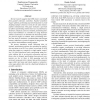Free Online Productivity Tools
i2Speak
i2Symbol
i2OCR
iTex2Img
iWeb2Print
iWeb2Shot
i2Type
iPdf2Split
iPdf2Merge
i2Bopomofo
i2Arabic
i2Style
i2Image
i2PDF
iLatex2Rtf
Sci2ools
113
click to vote
IEEEPACT
2000
IEEE
2000
IEEE
Address Partitioning in DSM Clusters with Parallel Coherence Controllers
Recent research suggests that DSM clusters can benefit from parallel coherence controllers. Parallel controllers require address partitioning and synchronization to avoid handling multiple coherence events for the same memory address simultaneously. This paper evaluates a spectrum of address partitioning schemes that vary in performance, hardware complexity, and cost. Dynamic partitioning minimizes load imbalance in controllers by using hardware address synchronizers to distribute the load among multiple protocol engines at runtime. Static partitioning obviates the need for hardware synchronization and assigns memory addresses to protocol engines at design time, but may lead to load imbalance among engines. We present simulation results indicating that: (i) dynamic partitioning performs best speeding up application execution on an 8 8-way cluster on average by 62% using four-engine as compared to single-engine controllers, (ii) block-interleaved static partitioning using loworder add...
Address Partitioning | Distributed And Parallel Computing | Dynamic Partitioning | IEEEPACT 2000 | Load Imbalance |
| Added | 31 Jul 2010 |
| Updated | 31 Jul 2010 |
| Type | Conference |
| Year | 2000 |
| Where | IEEEPACT |
| Authors | Ilanthiraiyan Pragaspathy, Babak Falsafi |
Comments (0)

